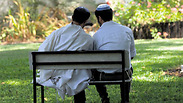
A homophile reading of Leviticus
Op-ed: If there is space within Orthodox Judaism for groundbreaking judgments that lessen unfair pain, there is an even greater need to alleviate undeserved and unnecessary suffering of God-fearing gays and lesbians within Orthodox world.
This pain deserves sympathy from coreligionists, who should see the injustice involved in being members of synagogues and communities that drive away fellow humans due to a God-given identity.
The Reform and Conservative movements duck this conflict by downplaying the divine origin of Leviticus. Yet spiritual cherry-picking is contrary to the spirit of traditional Judaism and should not be the path that Orthodox rabbis tread in order to render their communities more just and inclusive.
Is there nevertheless space for a sensitive understanding of Leviticus that paves the way for same-sex monogamy to be tolerated by Torah-observant Judaism?
In order to address this question, let us take a closer look at the much-cited sentence in Leviticus 18:22 that reads, "You shall not lie with a man as one lies with a woman, it is an abomination."
It is noteworthy that the Torah explicitly adds the formulation "as with a woman," even though for exegetical purposes to mention women does not contribute to clarify the commandment. Indeed, the Hebrew verb "shakhav" (to lie) is employed elsewhere in the Torah to describe sexual relations without further commentary. It seems that in this case, the commandment wishes to draw attention to the sexual involvement of both genders, namely men and women.
Within this context, let us remember that traditional Judaism prohibits pre-marital relationships and prescribes sexual expression within the framework of a life-partnership based on mutual companionship and fidelity. In principle and in practice, this view of human sexuality is compatible with a homosexual orientation given that both men and women can be faithful and devoted within the bounds of same-sex relationships.
On these grounds, it is reasonable to hypothesize that Leviticus mentions women within the abovementioned context to censor bisexuality. The reason for such censorship is that although a man or a woman may feel an innate attraction to members of both sexes, it is not possible to act upon this bisexual orientation without violating the norms of matrimonial fidelity that the Torah enjoins all human beings to follow.
This thesis is corroborated by a closer reading of the events in Genesis which involve Lot and the city of Sodom, and which are known as "acts of Sodom." When the mob assails Lot’s house with the intention of raping his three male guests, Lot endeavors to appease the assailants by offering them his two daughters in exchange.
This choice suggests that the mob is driven by bisexual urges. If Lot had believed otherwise, he would have presented male household members or offered himself to the lustful mob in their stead. This is additional evidence that the Torah reserves its opprobrium for bisexual promiscuity.
Orthodox communities should make space for this fresh
understanding of Leviticus. The alternative route is driving thousands of young religious Jews away from the Torah and abets the formation of thousands of dysfunctional families founded on self-denial and deceit.
Lest fundamentalists claim that this reading jeopardizes the immutable essence of Orthodox Judaism, let us remind them that in the present and in the past, prominent rabbis eschewed crude literalism to champion the rights of chained women, "mamzerim," farmers during sabbatical years and even interest-loan creditors in order to uphold the eternal values of the Torah.
If there is space within Orthodox Judaism for groundbreaking judgments that lessen unfair pain in the former cases, there is an even greater need to alleviate the undeserved and unnecessary suffering of God-fearing gays and lesbians within the Orthodox world.
Rafael Castro is a graduate of Yale and Hebrew University who studied in yeshivot in Bnei Brak and Jerusalem.










